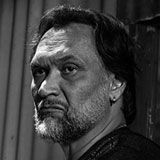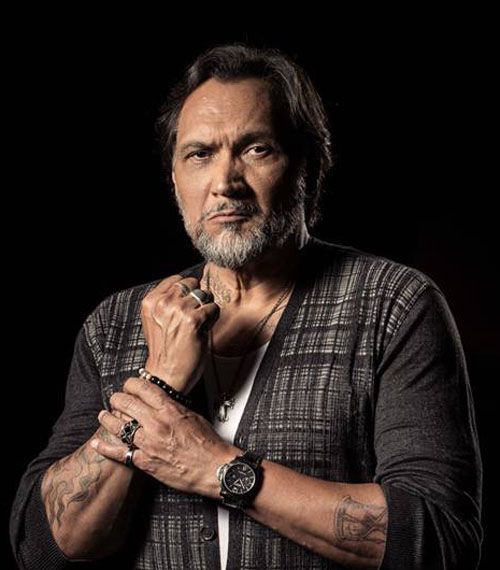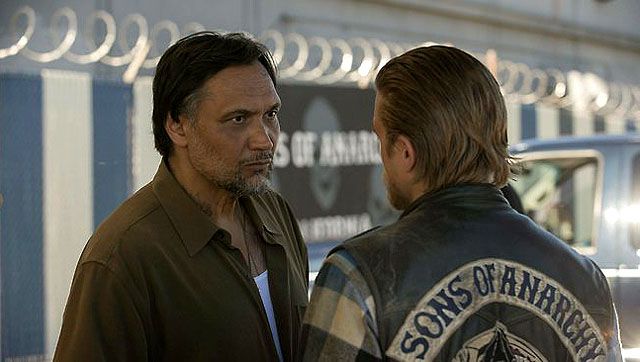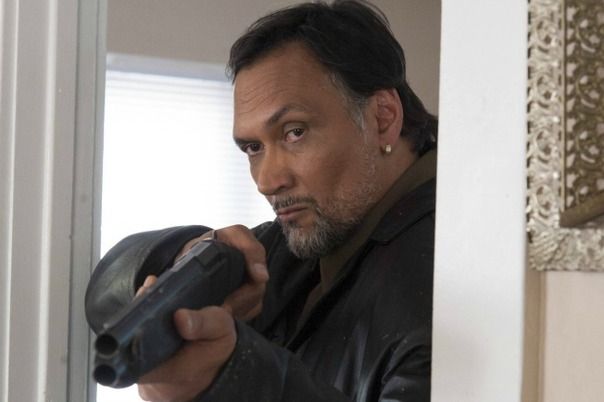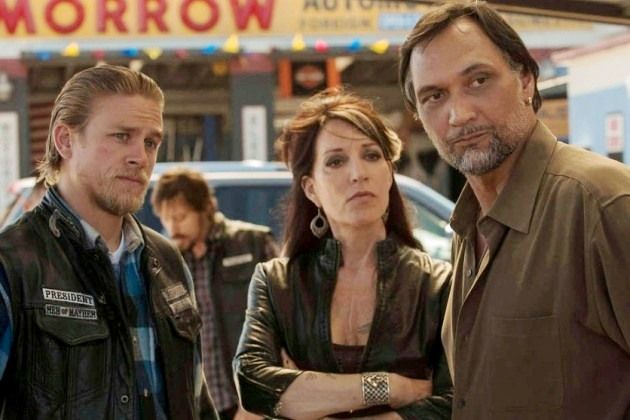Few actors have Jimmy Smits' knack for joining a series in progress and immediately becoming an integral part of its fabric.
It's a hallmark of his career ever since he stepped into NYPD Blue in its second season, earning five Emmy nominations for his performance as Det. Bobby Simone. He’s achieved similar feats on The West Wing, Dexter and, most recently, Sons of Anarchy, where since Season 5 he’s played pimp and Byz Lats gang leader Nero Padilla.
As the hit FX drama comes to a close tonight, Smits opened up to reporters about his time on the series and what it's meant to him.
On his takeaway from being part of the Sons of Anarchy family:
Jimmy Smits: The whole thing about the strength of family through thick and thin, and even though the whole thing about family is questionable with this particular family, but that’s something that was an ongoing: the club becomes the family and when things are done against the family, how the family kind of like sticks together – the glue. That was just a running theme, and to see that group from being a fan and watching them on television to partaking with them on the performance level, I think that that bond was really, really strong, so that’s something that I’ll always remember about that particular group and about what they conveyed – not only in the writing, but on a performance level as well.
On extending what was supposed to be a finite guest run into a long ride:
Of course going in, it was supposed to be 10 episodes and out … I remember having a conversation with Kurt [Sutter] at the end of the second season that I was on, which was Season 6, and he expressed interest in me thinking about the way he framed it, the Nero character becoming part of the mythology of the show … Besides that ongoing super-objective that he came in with – and was what his major character tag or pillar was that he wanted this kind of exit strategy – it’s something that permeated not only his character, but I think it influenced actions of the other characters – the character served this purpose of confidant, foil, love interest, all of those little spokes in the wheel that fleshes out the show in general.
The whole fluidity of television and the character and the performer – it’s not just open and close; it’s not like a film or a play in the sense that everything is spelled out and has a fluidity to it. I’m just happy that I had the respect of that group when I came in and they were very warm and open. And they are a very close-knit group and that kind of respect and had to do probably with the prior work, the fact that I had worked with Paris [Barclay] before, all of that and I think that bleeds over into the character as well.
On the shades of lightness in Nero's relationship with Wendy:
It’s one of Kurt’s strong suits, I think. If you look at the whole gamut of the seven seasons of the show, when he has characters that one would conceive or consider to be dark or askew, you can see it in all of the characters, actually: that Kurt operates best when he does this kind of one-two punch to the audience and can present kind of like lighter shade humorous side and then socks you with something that can be very emotionally impacting. I think that engages the audience in a lot of ways. It makes them root for these people who are on the “wrong side of the tracks,” so I like the fact that that he operates as a writer from that kind of level.
And with regards to Nero and Wendy, they both have the similarities that they have, that their sobriety is something that they have in common, so I think that that’s the strong bond that they share, or will continue to share. Whatever happens, that’s an element of it. I think it takes kind of the stink off the possibility that there’s a romantic thing: it’s more paternal, brother/sister kind. You get that vibe from the back-and-forth that they have, so it functions on a lot of different levels because of that.
On his reaction when he read the finale script:
I’ve been continually shocked with the past maybe five scripts, in terms of, like, "We’re really blowing shit up here." He’s going for broke, so it was always with like a little bit of trepidation on everybody’s part when that new script would come in, in your email or whether you would get it in page form, to make that turn of the first couple of pages to see what was next or who was going to go down next. I don’t think audiences are going to be disappointed at all. I think they’re going to be very satisfied and it’s touching in a lot of ways. It’s sad, but it’s also it’s grim, too.
On whether Nero will emerge as his most memorable role:
I hope there’ll be other memorable roles down the line, but I know I’m going to have fond memories of the group and this guy. When I first was jotting down little things in my little composition – high-school composition -- notebook, which I always buy for each of the characters that I have, I wrote down Jimmy S. and a slash and Jimmy Mi FamiliaMi Familia was kind of like a little sprouting seed of maybe where this guy wound up being. I don’t know – It was just a stream of consciousness kind of thing of what kind of attributes you want to give to a character. It’s like putting little strokes onto a canvas like if you were painting something.
I wanted to try to do something a little bit different, and I’m glad that Kurt really gave me that kind of opportunity to do something that was kind of like more guy/guy thing. You realize where a character falls, if you think of a series as a wheel and there are different spokes in the wheel that support it and keep it going. You have different characters that have different functions, a role to play on a basketball team, so I knew what was needed. That was expressed to me and you’re going to be this for Jax and that for Gemma and that’s where he’s going to – but it was important for me to try to keep a couple of balls in the air when I was juggling all of that.
On working with Kurt Sutter to reveal extra dimensions to Nero:
Kurt and I, there were conversations that we had because I just didn’t want to be just that. I wanted to make sure because it’s a show about outlaws and people on the wrong side of the tracks, that you kept that vibrant as well, so it wasn’t just a guy coming to have somebody cry on his shoulder and giving coffee out. We definitely had to, because he’s got a lot going on. There are a lot of characters to serve and you have to find ways – if we keep that other element going, it makes everything else more believable, so I’m just glad that there was a kind of real back-and-forth respect and trust that we had with each other.
And our conversations in Season 5 actually started getting less, not more. You would think that it would be as the character flourishes, you would have much more, but they were less, less frequent, but when they happened, they were more intense is not the word. But to the point and there’s a realization on my part that he’s spinning a lot of plates, so you have to be very succinct in terms of getting what points you need or what you think needed to be looked at in a particular scene, because you want to try to do that before you get on set. Things when they happen when you’re on set, when you want to start making changes, it doesn’t make for a good environment in television because of the quickness that you have to work.
On how he relates to Nero:
The whole thing with him about how religion is part of his life or some kind of spirituality was just like a simple little kind of brush stroke on the writers’ part, I think, and that became very important to me. I don’t want to say I embellished it, but I gave it a lot more weight and I think because of that they wrote then subsequently they added more and that’s satisfying to me because I like the fact that this guy that seemingly has a spiritual side to him, too, that’s intense. And it made sense to me because of the fact that he’s sober and the higher power and all that stuff, so Jimmy relates to that. That was a nice little flair that the character had that I like and can relate to.
On this season's heart-wrenching exchange between Nero and Jax in "Suits of Woe":
I think it was the culmination of what the relationship has been between these two characters over three seasons, and certainly the weight of what the Jax character has been carrying or feeling for the past seven seasons. Because of that relationship between Jax and Nero, there was the availability of a kind of vulnerability, those words that Kurt wrote that came out of Jax’s mouth there about the bottom line – "No matter what’s happened, she’s my mom" – have to really resonate in a huge way.
I’m kind of happy that the way that turned out and just like on a performance level that we were able to have enough trust between us as actors; and that Peter Weller, who directed that particular episode, just said minimal stuff and just let it happen, but was very supportive, so I think it resonates and has the power that Kurt intended when he wrote it.
On his reaction to the trailer for Star Wars: The Force Awakens:
I did see the trailer and I got a text from my son the other day and said, “Have you seen the trailer?” And I texted back, “Why are you sweating me like that?” He wrote back, “???, oh, Dad, I’m sorry,” because he knows it’s kind of like a sore spot with me. The trailer looks great and I’m really excited about seeing it and how the mythology … just continues.
On whether he plans to swipe all of Nero's signature cardigans:
No, not all of them, but there’s one that I really got my eye on that I like a lot that I’ve told Kelly about. His cardigans had a life of their own
On his most memorable scenes during his run on the series:
The two scenes in Episodes 10 and 11 of this season were both very difficult because it had to do with focus, just the head space of where I am in my life, in Jimmy’s life, so those were kind of difficult. But you got to know that in Season 5 when my partner in life was playing a character and that character had to go down, that was a very tough day because you’re looking at a character who is supposed to be your sister, but in real life it’s the person that you live with and love with. That was a memorable, difficult day as performer and character as well.
On what SoA brought to television:
We’re in this time in television where we have all of these channels and niches, and I think the great thing about it is this kind of golden age of TV, because the canvas is much broader, and you can go into much more specifics. I think that audiences want to relate to or want to know about different worlds that they might not get on a network TV; your typical doctor, lawyer, police type show.
So it affords the opportunity to get a professor who’s dying who runs a meth lab, or how it was in New York and New Jersey in the ‘20s; those types of things and really become engaged with those characters, and in this case with a world that you think you might know something about, but don’t really know about. And then layer that or texturize it with all of those things that that world and what they learn about that world and the things that every particular family has; the family dynamics, the codes that a family has, the hierarchy and that’s what engages it.
I think Kurt was really successful with the writers in terms of presenting this kind of Shakespearian story, in a lot of ways, that has a lot of emotionality and humor and tragedy and all of that, violence, but at the same time has this thread of family and brotherhood. So those are the things that I think really engage audiences with the show specifically.
On the experience of shooting the finale:
Your investment has not only been with the characters and the story, but the crew that you spent, in Katey’s case, seven years with, that crew has been very kind of cohesive. There haven’t been a lot of changes and the crew really loves the show. They’re, like, into the show. There are a lot of tattoos on that crew, let me just say that, so I guess in that way there were a lot of tears. There’s a sadness that that family unit that you develop because you do work for so many hours is going to disperse and we kept on reaffirming that we know we have great memories and that we’ll see each other again hopefully down the line, because this business is all kind of circled, but it was sad.
I finished up I think it was halfway into the shoot, so there was that particular eight days. And I came back – I would come back for a couple of hours every day until we wrapped because I wanted to be there for like Charlie’s last scene or the last scene of particular characters, and a lot of people did that, so it was very emotional.
On his reaction to the finale, when all was said and done:
I was a little, as everyone was in the cast, it’s a little tense and shocked, but you understand. It’s all part of the culmination of what has been brewing in Kurt’s head for all this time. It’s good. As far as the last season is concerned, I think that Kurt ended it really beautifully and it has all of those elements that the show has been the signature of the show throughout the seven seasons. I was a little surprised specifically about the way Nero ends up, but I totally get it. I totally get it. That’s about as much as I can say without doing spoilers and stuff.
On his own motorcycle skills:
When I first knew that I was going to be working with the show, Kurt and I were just having meetings and I didn’t know where it was going to go, so the first thing I did besides re-watching all the episodes at that point – it was five seasons over a weekend – I went out there and I got my motorcycle license. And there’s this great group of people in Southern California, and a lot of them are women, that have this motorcycle training facility and I got my license and did a crash course and I was pretty happy. And then I found out that it wasn’t going to happen.
We keep in contact, and also my stand-in – we’ve been together for like 20 years now, he’s a motorcycle rider, so we rode a lot together. Through the past three seasons, I always keep myself in tune, hoping that one day I’m going to open up the script and it’s going to say “… and then Nero jumps on Jax’s motorcycle and rides away.”
The Sons of Anarchy finale airs tonight at 10 ET/PT on FX.

